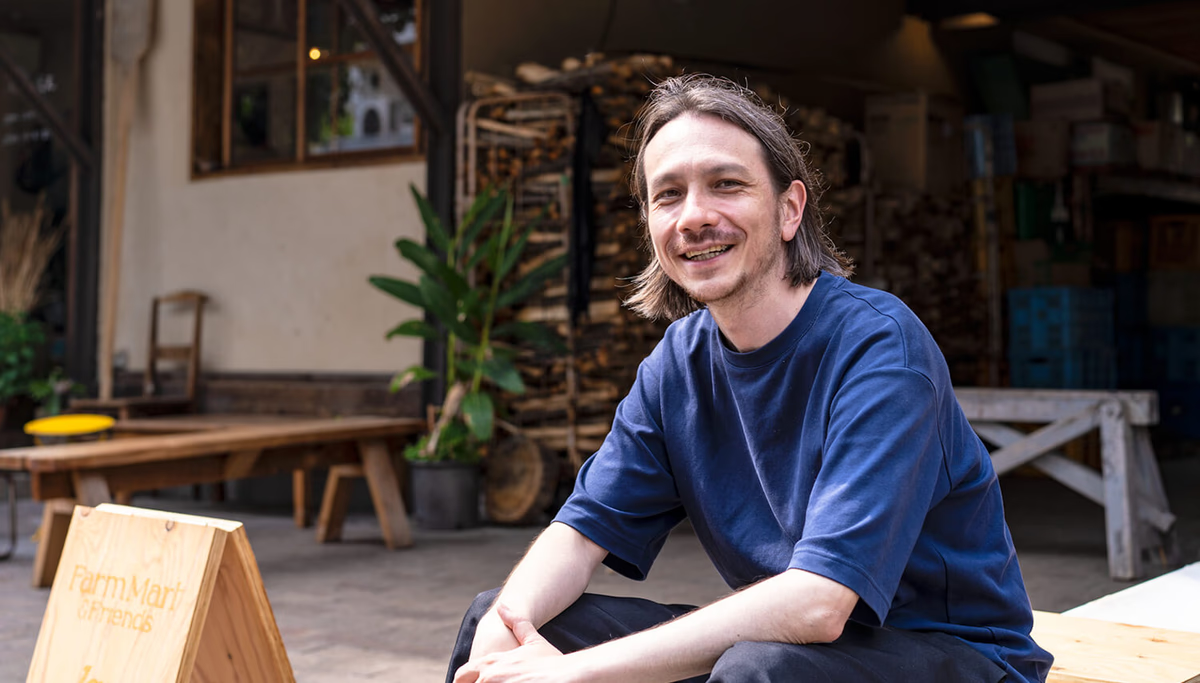こんにちは。京都在住のライター・杉本です。
FarmMart & Friendsでおいしいビールとおつまみ、冷たいドリンクとドーナツを買って、外のベンチでくつろぎたいな……と思いながら、お庭を抜けて代々木オフィスを訪ねました。
「自由と責任 みんなの制度と働き方実験室」は、フルフレックス&フルリモートで働く、モノサスメンバーのワークスタイル、会社に対する考え方や仕事観を聞くインタビューシリーズです。今回はディレクターの原田礼さんに、ものさすサイト事務局の滝田怜子さんとふたりでお話を伺いました。
神山ものさす塾を卒業してモノサスに入社した
杉本:原田さんはモノサスに入社して何年目ですか?
原田:2018年に徳島・神山町で開かれた第4期ものさす塾(フロントエンドエンジニア、ディレクター養成カリキュラム)に参加して、終わった後にそのまま入社しました。
杉本:なぜ、ものさす塾に?
原田:前職がなくなってしまったので、新しい仕事を探さなきゃというところです。以前は金融関係の仕事だったのですが、キャリアチェンジするチャンスがあるならと思って参加しました。
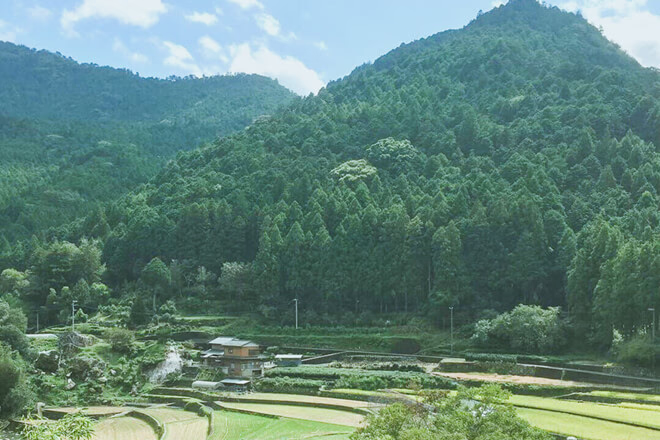
神山はこんなところです。
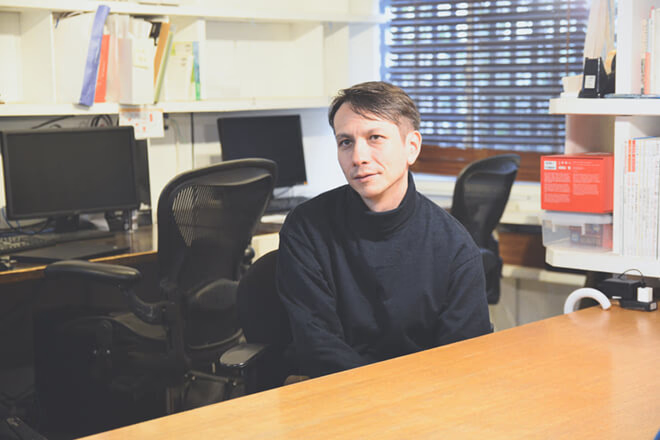
入社当時の原田さん。髪が短いです。
杉本:入社当時はすでにフルフレックス制度が導入された後ですね。代々木オフィスに来てからは何時から働いていましたか?
原田:最初はコーディングファクトリー(CF)部に配属されて、9時から18時みたいな感じでした。2年前にユニット制に移行してからは、1年目は「伊藤ユニット」昨年からはWeb全般をつくる「原田ユニット」を立ち上げました。ユニット・リーダーになってからは、8時半くらいから疲れきるまで働いています。
杉本:コロナ禍でフルリモートになってからは、どこでお仕事していたんですか。
原田:出社しないとできないクライアントワークがあったので、基本はオフィスで仕事をしていました。今はその条件が緩和されたので、週に半分くらいは自宅で作業しています。
杉本:プライベートな場所で仕事をするとき、オン・オフの切り替えが難しくはありませんか。
原田:周囲がうるさくても集中できるほうですし、どっちがいいというのはないけれど違う感じはしますね。ただ、モニターは家のほうが大きいので作業環境的にはやりやすいし、若干生産性は高いのかもしれない。椅子は会社のほうがいいから疲れにくい気がします。
クライアントに対して「技術的にできない」と言ったことはない
杉本:モノサス入社後、未経験の領域で技術や知識を学んでいくのは大変ではありませんでしたか。
原田:ものさす塾に入る前に、独学でちょろっとプログラミングをやっていたので、「プログラムはどうやって動くか」はだいたい理解できていたので、特に不思議に思うこともなかったし、つらいことはあまりないです。この仕事はわりと自分に合っていたんじゃないかと思います。
杉本:コーディングは、間違いなく作業すれば確実にプログラムが動く。そういうところが「自分に合う」と思われたのでしょうか。
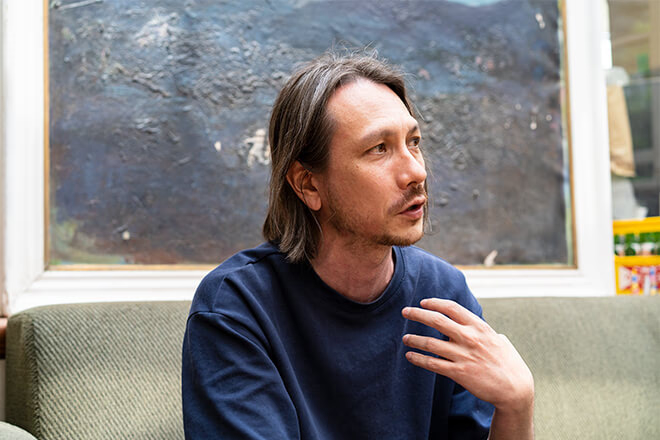
原田:どうですかね。成果物として求められているものがはっきりしているのは、ある意味で楽だと思うんですよ。そういう部分で、コーディングって楽じゃないの?と思います。どんどん生まれてくる新しい技術にキャッチアップして、自分のプロジェクトにどう生かすかを考えるのも楽しいですね。
僕は、クライアントに対して「技術的にできない」って言ったことはないんです。それは、僕の技術力が高いからではなく、世の中に出ているものは絶対につくれると思っているからなんです。調べ方も知っていますし、検索力も高い方だと思うので、「どうすればできるか?」という方法はすぐに見つけられますから。
新しい技術を開発する人たちと同じ文脈に近づきたい
杉本:知らないことを調べること自体、「また新しいことを学ばなければいけないのか」と負担に感じる人もいると思うんです。原田さんはそうではないんですね。
原田:そうですね。負担に感じる人も多いだろうけど、少なくとも僕のユニットメンバーにはそういう人はいないと思います。僕は自分が正しいと思っていないので、新しい技術は必ず取り入れるようにしているんです。古い技術を使い続けるのは、常に自分が正しいと思っているのと同じじゃないですか。僕は、常に自分が正しいとは思っていないので、そもそものスタートが違うかなという気がしますね。
杉本:その話、もう少し詳しく聞いてみたいです。
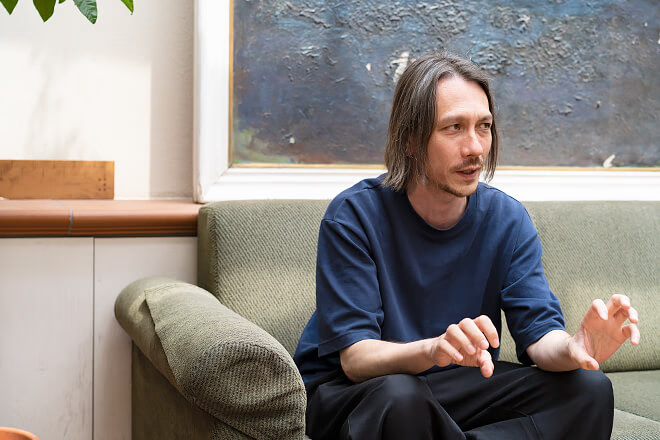
原田:古い技術は、間違っているところを直す方法も確立しています。すると、自分がやりたいことと安定させるという「やりたくない作業」も絶対にセットでやらなければいけない。新しい技術は、安定させるための作業をしなくてすむようにつくられるわけです。だから、新しいものは「正解」なんですよ。
「新しいからまだ安定していない」と嫌う人は多いけれど、安定するのを待っているとその技術は古くなってしまう。また、保守が止まっているソフトウェアは、安全性の観点からも問題がありますから、活気のある新しいライブラリを早い段階から使って自分で安定させたほうがいい。本当にみんな、そういう考え方で技術とつきあってほしいと思っています。
杉本:なるほど。新しい技術の不安定さは、エンジニアの関わり方しだいで補完されて安定したものにできるということですね。新しい技術が何を乗り越えようとしたのかを理解して、エンジニアとして「正解」に近づけていく。原田さんは、そういうふうに技術と向き合うことを大事にされているのかなと思いました。
原田:そうですね。たとえば、オープンソースのコードを使うときも、開発者コミュニティでバグに関する会話を見れば、問題を解決する気があるのかどうかがわかります。僕の技術力ではオープンソースのコード開発に参加するのは難しいけど、新しい技術を開発する人たちのもっている文脈にできるかぎり近づきたい。そうすると、コーディングするときも見え方が変わってきますし、その結果としてより仕事がしやすくなっていくんです。
杉本:そうやって技術が生まれ変わっていく世界が、原田さんは好きなんですね。
原田:たぶん好きなんだと思います。
自分の「ものさし」とモノサスの「ものさし」を共存させる
杉本:「自由と責任」で大久保さんにインタビューしたときに、「モノサスっぽさってなんだろう?」という話があったんです。原田さんは「モノサスっぽさ」ってどういうことだと思いますか?
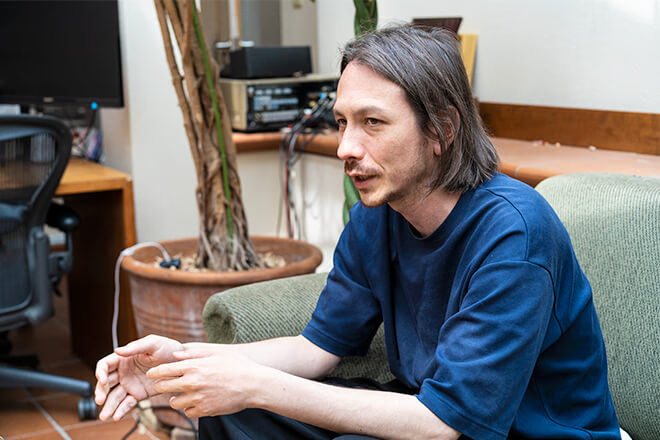
原田:超むずかしいですね。モノサスっぽさって、なんとなくわかるけれど定義はできない感じがします。僕もこの会社にフィットしていないところがすごくいっぱいあるし、モノサスっぽくなくていいと思っています。でも、自分からフィットしに行こうとすると小さくなっちゃう気がするのでイヤなんです。会社からフィットしにいったらいいと思うけれど、本人が自分の「ものさし」をつくろうとしていないとフィットしてあげられない。
僕より前に入社した人たちは、まだワイルドな状態の会社のなかでモノサスっぽさをつくっていったと思うんです。僕は会社がしっかりした後に入社したので、参加しやすいようにお世話してもらった感じがあります。ただ逆に、そこに会社としての苦労が起きている気もするんです。
杉本:地域への移住でも、ワイルドな状況を自分で切り拓いていく人のほうが根付いていて、お膳立てされて移住した人は意外と苦労するように思います。もしかしたら、それに似た話かもしれないですね。
滝田:私はワイルドななかでもマイルドに育てられたほうですけど(笑)。原田さんの会社へのフィットの方法でいうと、共存するのがうまいなと思うんですよね。無理にフィットしようと合わせことはせずに、うまく隣を歩くなあって。社内で意見を言いはじめたときも、「新しい人がなんか言いはじめたぞ」という感じから、「あ、原田さんが意見するなら」ってどんどん変わっていったなと思っていました。
原田:そんなふうに見ていただけるとありがたいですね。フラットに意見を言っていい会社であっても、後輩として入って意見を通すには時間がかかるんですよね。たぶん、仕事の面で認めてもらえるようになると、言葉にちょっと強さが出てきて聞いてもらえるようになる。そういうところは、モノサスは自由に見えて意外と旧式な感じがします。
今、モノサスでは大きな新陳代謝が起きようとしている
杉本:原田さんは、会社をちょっと俯瞰して見ている感じがするのですが、モノサスはどんな会社だと思っていますか?
原田:最近、大きな新陳代謝が起きようとしている感じはすごくします。社食研が一気に事業として成り立ちはじめて、会社のなかで力を持つようになってきていると思うので。今までは、「会社の柱はWebの事業で、食の事業はチャレンジ」と捉えている人も多かったと思うんです。でも、これからは「食の事業もあるんだし、Webの事業はもっと自由にチャレンジしていけばいいんじゃないの?」という流れが出てくると思うんですよね。実際にはまだ変化は起きていないし、みんなも気づいていないけれど、変わる準備はできている感じがしています。
杉本:そんなモノサスのなかで、あるいは個人的に、原田さん自身がやりたいことはありますか?
原田:その瞬間瞬間で、小さいやりたいことはいっぱいあるんですけど。たとえば、僕はコーラが好きなので、ペプシでもコカコーラでもない、僕の好きな味のクラフトコーラをつくってみていて、探求予算を取る準備はしています。
僕自身は、人を応援するのがすごく好きなんです。だけど、ふわっとした状態の話を聞いた瞬間にそれを実現する方法を思いついて具体化しちゃうのがジレンマなんです。今、話してみて気づいたけど、人をうまく応援することが「やりたいこと」かもしれません。
杉本:ふわっとした状態を温めて、本人が方法を見つけられるようにしてあげたい。
原田:そうですね。やはり、西村佳哲さんは「インタビューの教室」などを開かれているだけあって聞き方がうまいなあと思うし、真鍋さんもあえてスピードアップせずに見守っているときがあるなと思います。僕は、ジャングルを自由に歩けるように「サバイバルナイフの使い方」を教えたいんですよ。だけど、気がついたら「安全なジャングルの歩き方」を教えてしまう。ジャングルを安全に歩いたらつまらないじゃないですか? でも、パッと見たときに「絶対失敗するな」と思うと耐えられなくて、つい介入してしまうんですよね。
杉本:「新しい技術を使って安定させる」「方法を考えてしまう」とか「人をうまく応援できるようになりたい」とか。仕事や人との関わり方のあたりに原田さんが大事にしていることがありそうだなと思いました。ありがとうございました!
2021年7月に原田さんがMVPを初受賞されたときに、林さんが「最初に会った時からけっこう尖ったやついるな〜と思いながら見守っていました」とコメントしていたのが印象に残っていました。今回、ゆっくりお話を伺って「たしかに視点は尖ってるけど、ものごとの受けとめ方がすごくやわらかくて、そこが原田さんの魅力なんだなぁ」と思いました。次にお会いするとき、どんなお話を聞けるかとても楽しみにしています。
